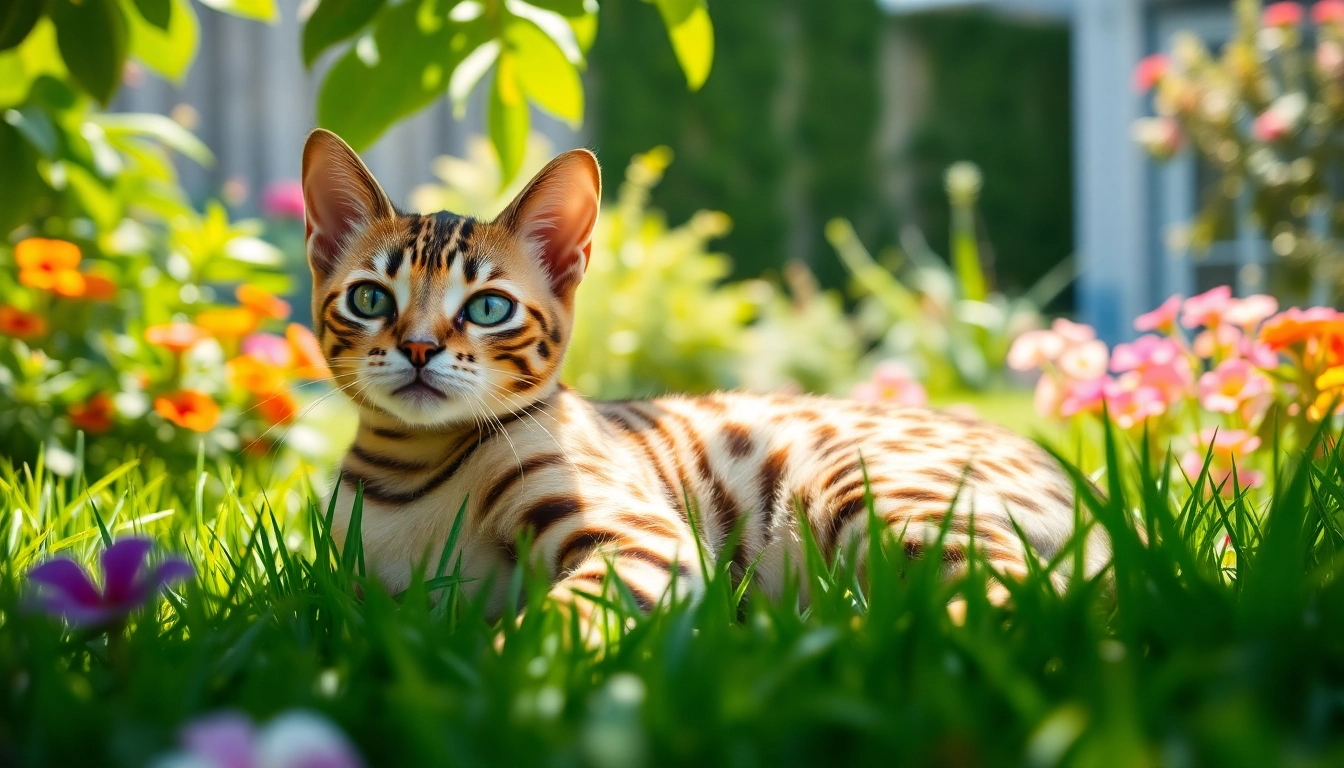Understanding the Bengal Breed
History and Origins of Bengal Cats
Bengal cats are an exotic breed known for their striking appearance and playful behavior. Their history dates back to the 1960s when they were first developed in the United States by crossing domestic cats with the Asian leopard cat — a small wild cat native to Southeast Asia. This crossbreeding was primarily the work of Jean Sudgen Mill, who aimed to create a breed that maintained the wild appearance of the leopard cat while exhibiting a domesticated temperament.
Over the years, careful breeding practices have resulted in Bengals that showcase their unique heritage through distinct patterns, such as marbled and spotted coats, shimmering fur, and large rosettes reminiscent of leopard spots. Recognized by the International Cat Association (TICA) in 1983, Bengals have gained popularity among cat lovers for their captivating looks and dynamic personalities.
Physical Characteristics of Bengals
Bengals are medium to large-sized cats, typically weighing between 8 to 15 pounds. One notable feature is their muscular build, which is a result of their active nature. Bengals generally have a wild appearance, attributed to their distinct coat patterns, which can include both spotted and marbled designs, creating an illusion of depth.
Their coats are short, soft, and dense, often exhibiting a unique glitter effect caused by the structure of the hair. Bengals typically have large, almond-shaped eyes that can come in various colors including green, gold, or blue, depending on the coat color. Their large ears and whisker pads contribute to their striking facial features, further enhancing their wild look.
Personality and Temperament Traits
Bengal cats are renowned for their lively and playful demeanor. They are highly intelligent animals, often described as affectionate yet independent. Their playful nature means that they require regular interaction and stimulation, making them entertaining companions for active households.
Despite their wild ancestry, Bengals tend to bond closely with their human families and can be quite social. They thrive on mental and physical activity, which means playtime with interactive toys, climbing structures, and puzzle games is essential for their wellbeing. However, their active nature can lead to mischief if they become bored, so providing a structured environment tailored to their needs is key.
Choosing Bengal Breeders in Orange County
The Importance of Responsible Breeding Practices
When looking for Bengal breeders in Orange County, it is essential to prioritize responsible breeding practices. Responsible breeders adhere to ethical guidelines established by organizations like TICA and focus on the health and well-being of the cats they breed.
Such breeders conduct health screenings for genetic diseases common in Bengals, including Hypertrophic Cardiomyopathy (HCM) and Progressive Retinal Atrophy (PRA). This comprehensive approach helps to ensure that the kittens are healthy and reduce the likelihood of future health issues.
Key Questions to Ask Potential Breeders
To ensure that you are choosing a reputable Bengal breeder, it is crucial to ask the right questions. Here are some important inquiries to consider:
- What health testing do you conduct on your breeding cats? Look for breeders who prioritize genetic testing and can provide documentation.
- Can I meet the kitten’s parents? Meeting the parents can give you insight into the temperament and health of your future kitten.
- How do you socialize your kittens? A good breeder will expose their kittens to various people, sounds, and environments to foster a well-rounded personality.
- What kind of diet do you provide to your kittens? Understanding their dietary practices can affect your kitten’s health in its early development.
- What is your return policy? Reputable breeders will typically have a return policy in case you can no longer care for the cat.
Understanding Registration and Certification
In the world of cat breeding, registration and certification from a recognized organization are vital indicators of a breeder’s legitimacy. Look for breeders who are registered with TICA, as this means they adhere to established breeding standards and ethical guidelines.
Furthermore, registration provides a pedigree report for the kittens, tracing their lineage and ensuring that they come from a line that values health and temperament. These documents assure prospective owners that their new pet is a genuine Bengal, with all the necessary traits and characteristics associated with the breed.
Puppy Selection and Adoption Process
How to Identify a Healthy Bengal Kitten
When selecting a Bengal kitten, it is important to recognize the signs of a healthy animal. Look for the following:
- Clear Eyes: The eyes should be bright, clear, and free from discharge.
- Healthy Coat: Bengal fur should be shiny and free from bald spots or irritations.
- Active Behavior: A healthy kitten will be playful, curious, and alert, showing interest in their surroundings.
- Good Appetite: Inspect their feeding habits and ensure the kitten is eating well and gaining weight.
- Clean Ears and Nose: A healthy kitten has clean ears and nose with no excessive discharge.
Best Practices for Preparing Your Home
Before bringing a Bengal kitten home, you should ensure that your environment is safe and welcoming. Here are some steps to follow:
- Create a Safe Space: Designate a quiet room where the kitten can acclimate and feel safe. Provide a cozy bed, litter box, and essentials.
- Remove Hazards: Bengal cats are naturally energetic and curious. Ensure that harmful substances and small objects are out of reach.
- Invest in Essential Gear: Collect items such as scratching posts, interactive toys, and climbing trees to cater to their playful nature.
- Sustainable Diet: Set up a feeding schedule and pick a high-quality kitten food formulated specifically for Bengal cats.
- Veterinary Care: Choose a veterinarian experienced with Bengal cats and schedule an initial check-up post-adoption.
Transition Tips for New Bengal Parents
The transition period for a new Bengal kitten can be both exciting and challenging. Here are some tips to facilitate a smooth adjustment:
- Establish Routines: Kittens thrive on routines, so keep feeding, playtime, and sleep schedules consistent.
- Give Them Time to Explore: Allow the kitten to explore its new environment at its own pace, providing safe spaces for it to retreat.
- Encourage Bonding: Spend quality time with your kitten, engaging in interactive play and gentle handling to foster trust.
- Monitor Changes: Watch for any signs of stress, such as hiding or excessive vocalization, and give your kitten extra reassurance.
- Be Patient: Some Bengals take longer than others to adapt, so remain patient as they settle into their new home.
Care and Maintenance of Bengal Cats
Feeding Guidelines for Optimal Health
Feeding your Bengal cat a balanced diet is crucial for ensuring optimal health. A proper diet should consist of high-quality cat food enriched with essential nutrients and proteins, which are vital for their active lifestyle. Here are some essential guidelines:
- Balanced Diet: Choose cat food formulated for active breeds, ideally featuring high protein content from real meat sources.
- Regular Feeding Schedule: Establish fixed meal times to help regulate their metabolism and reduce overeating.
- Fresh Water: Ensure that your Bengal has access to clean and fresh water at all times, as hydration is crucial to their health.
- No Human Food: Avoid feeding your Bengal human food, as it can lead to obesity and health issues. Stick to vet-recommended cat treats.
- Monitor Weight: Keep track of your Bengal’s weight to avoid overfeeding, obesity, or underweight issues.
Routine Veterinary Care and Health Checks
Regular veterinary care is vital to maintaining the health of your Bengal cat. Schedule routine visits, generally once a year or as advised by your veterinarian, to monitor health and vaccination statuses. Here are some key aspects of Bengal cat healthcare:
- Vaccinations: Keep your Bengal up to date on vaccinations to protect against common feline diseases.
- Spaying/Neutering: Consider spaying or neutering to prevent unwanted litters and reduce health risks.
- Dental Care: Dental hygiene is vital for Bengals; invest in a dental routine that includes brushing and dental treats.
- Parasite Control: Regular treatments for fleas, ticks, and worms will help keep your Bengal safe from parasites.
- Health Checks: Be proactive and look for any unusual changes in behavior, eating habits, or energy levels.
Grooming Needs and Techniques
Bengals have short, dense coats that require minimal grooming, but regular attention helps maintain their fur’s health and reduces shedding. Proper grooming techniques include:
- Brushing: Brush your Bengal at least once a week to remove loose hair and prevent matting.
- Bathing: Only bathe your kitten when necessary, using cat-safe shampoo to maintain healthy skin.
- Nail Trimming: Regularly trim their nails every few weeks to prevent overgrowth and associated injuries.
- Ear Cleaning: Check their ears regularly for dirt and wax, cleaning gently with a moist cotton ball if necessary.
- Professional Grooming: Consider professional grooming services if your Bengal’s coat develops unique issues or you need additional assistance.
Connecting with the Bengal Community
Local and Online Bengal Enthusiast Groups
Building connections within the Bengal cat community can provide invaluable resources and support for owners. There are numerous local and online groups dedicated to Bengal enthusiasts where you can share experiences, ask questions, and learn:
- Social Media Groups: Platforms like Facebook often have dedicated Bengal groups where you can interact with other Bengal owners.
- Local Cat Clubs: Look for local cat clubs that host events, workshops, and competitions for Bengal enthusiasts.
- Online Forums: Websites dedicated to cat breeds often have forums where you can ask questions and exchange information.
- Community Events: Participation in local events like cat shows can provide networking opportunities and educational sessions.
Participating in Cat Shows and Events
Engaging in cat shows can be a rewarding experience for Bengal owners, offering the opportunity to showcase your cat and connect with others in the community. Here are some tips on how to get involved:
- Research Local Shows: Check local listings and cat association websites to find cat shows in your area, particularly those focusing on Bengal breeds.
- Prepare Your Bengal: Spend time grooming and socializing your Bengal before the show, ensuring they feel comfortable in a new environment.
- Understand Show Rules: Familiarize yourself with the rules and requirements of the show, including registration details and judging criteria.
- Meet Other Enthusiasts: Use the event as an opportunity to network, share experiences, and gain insights from more experienced breeders and owners.
Resources for Bengal Cat Owners
Having access to the right resources ensures Bengal owners can provide the best care possible. Here are some valuable resources to explore:
- Books on Bengal Care: Reading literature on Bengal care and training can provide insights into the breed’s specific needs and challenges.
- Online Courses: Consider taking online courses that cover feline care and behavior to enhance your understanding of Bengal needs.
- Veterinary Resources: Keep a list of trusted veterinarians, especially those who specialize in exotics or Bengal-specific care.
- Newsletters and Magazines: Subscribing to cat-related publications can inform you of the latest breed news, training tips, and health advice.



